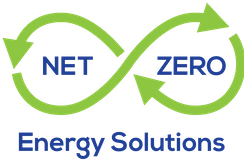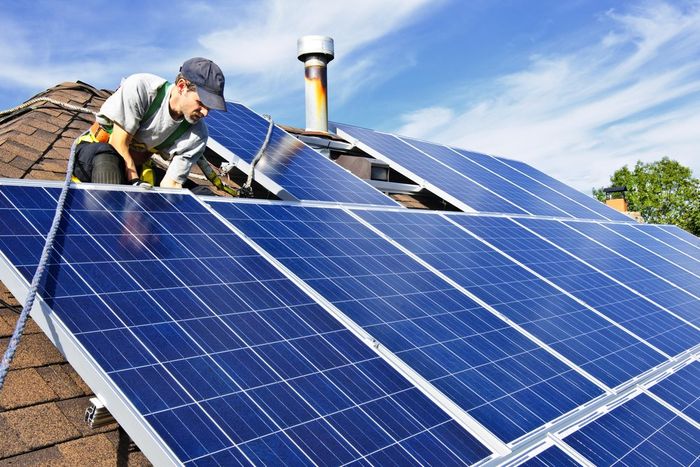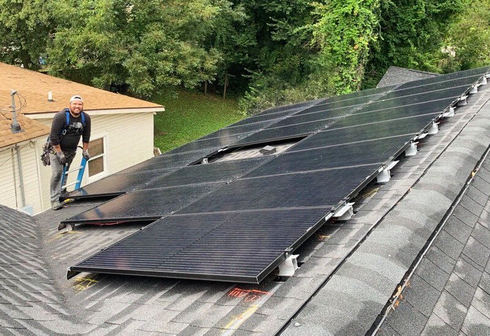ROOFING + SOLAR
Roofing prices with NetZero Energy Solutions are phenomenal. Homeowners may qualify for up to 30% off the total cost.
Contact us today to find out more!
WHEN DOES NET ZERO SOLUTIONS DO ROOFING?
Before you install solar panels, consider having your roof evaluated to make sure it can withstand installation, especially if the roof is towards the end of its life. If your roof is between five and 10 years from needing replacement, it’s a good idea to get an expert out there to assess.
Most solar companies don’t offer roofing services, although there are some exceptions. Either way, re-roofing is commonly done alongside a solar installation, and instead of providing you with referrals, and having you deal with another company, Net Zero Solutions consolidates everything into one company, allowing the process to go with better ease, and progress quicker.
Solar panels are more durable than most roofing materials. As a result, when you pair solar with a roof replacement, the panels actually extend the lifetime of the portion of the roof that they cover.
The other benefit of pairing solar and a roof replacement together is that if you’re installing on a new roof, it’s unlikely you’ll need to re-roof during the lifetime of the system. This can help save you money in the long run, because you can avoid the costs associated with removing and reinstalling the solar panels on your roof.
DOES IT MAKE SENSE TO INSTALL SOLAR PANELS IF YOU NEED TO REROOF?
An average solar installation will save homeowners tens of thousands of dollars over its lifetime. While re-roofing costs can be high, the savings of going solar should make up for it in the long term, and there’s no better time to evaluate solar if you were planning on re-roofing anyway (those panels love new roofs!).
In some cases, then entire portion of the roof may not be eligible to a tax credit according to the IRS, in that case, it is necessary to schedule a consultation, to calculate the costs associated with the solar panels, and effectively advise what the total project will cost and incentives.
ONE TIME PACKAGE DEAL CLAIM
If you choose to replace your roof, then we are currently offering packages that cover re-roofing, solar panels, and gutters to help make the project more affordable for you.
OUR SERVICES
REQUEST A FREE CONSULTATION
For more information or to request an appointment, call us at (631) 223-6530 or fill out the form below.
Get In Touch
We will get back to you as soon as possible.
Please try again later.
- How do panels turn solar energy into electricity?
Solar panels convert the infinite energy from the sun into electricity—even on cloudy days. Unlike power generated by fossil fuels, solar energy does not create noise, air, or water pollution. Solar panels, which are made up of photovoltaic (PV) cells, convert sunlight into direct current (DC) electricity throughout the day. Since most homes in the United States run on alternating current (AC) electricity, the DC electricity generated by solar panels is then converted into AC electricity through inverters. You can use the converted electricity to power your home. Any excess energy you produce will be contributed back to the grid and can become a credit on your next energy bill.
- How do the PV cells work?
PV cells allow particles of light, which are called photons, to knock electrons free from atoms. This process generates electricity, a form of power you can use just about anywhere.
- What are the financial benefits of solar energy?
By reducing the electricity you get from the grid, solar lowers your bill. How much you can save depends on the electric rates in your area. There may also be significant federal, State, and local tax credits for installing solar at your home. You may also be able to create an additional income for your home by selling excess production back.
- Will my house still be connected to the grid?
When you go solar, you will still be connected to the grid. This allows you to draw from the grid when your system is not producing all the electricity you may need. This also allows you to be compensated for providing power to the grid when you are producing more electricity than you need.
While most New Yorkers choose a grid-connected system, it is possible to go off the grid with solar if your house has energy storage capabilities. However, energy storage does present additional costs.
- What are the environmental and health benefits of solar energy?
Solar is one of the cleanest forms of renewable energy. By switching to solar, you reduce your carbon footprint and help New York fight climate change. Solar also reduces the presence of harmful air pollutants like sulfur dioxide, which may cause serious health problems. Ultimately, by going solar, you are contributing to a cleaner and healthier community.
- How will I be compensated for my solar energy?
With solar, your home can go from being an energy consumer to being an energy producer. Electric utilities will credit your bill for the power your home produces using solar panels. You’ll only pay for electricity if you use more than what your solar panels generate during that billing cycle. Any excess electricity you produce that month becomes a credit on your next electricity bill (though you may still have to pay other charges and fees).
- How many panels will I need for my home?
It depends on your home’s energy needs. Net Zero will work with you to assess those needs. A good starting place is to gather a year’s worth of your electricity bills. Net Zero will use that information and assess your home or building’s sun exposure, the size and slope of your roof, available roof space, and other factors to determine how big your system will need to be. We can also tell you if a ground-mounted system may be a better fit for your site than a rooftop system. Contact us to get a detailed assessment.
- How Do I Pay For Solar?
When paying for solar, you always have multiple options. You can choose to take a solar loan, which can offer wonderful financing deals which can alleviate the upfront investment. You can choose to pay with cash, which would increase the value of your home, and bring strong long-term returns. If affordability is an issue, you may be able to contact us so we can walk you through technology tax incentives and how they can help afford solar.
We bring pride and passion to every project that we undertake, with a professional team of designers, project managers and tradespeople.
Contact
info@nzesus.com
(631) 223-6530
Locations
New York City, Hicksville NY, Levittown NY, Plainview NY, Westbury NY.
Services
IT'S TIME TO TURN SUNLIGHT INTO SAVINGS.
Serving the Hicksville NY, Levittown, NY & surrounding areas.
The information on this website is for general information purposes only. Nothing on this site should be taken as professional advice for any individual case or situation. This information is not intended to create, and receipt or viewing does not constitute, a customer company relationship. Net Zero Solutions are not liscensed tax professionals. Any tax information on this website is not to be taken for professional tax advice.
All Rights Reserved | Net Zero Energy Solutions




